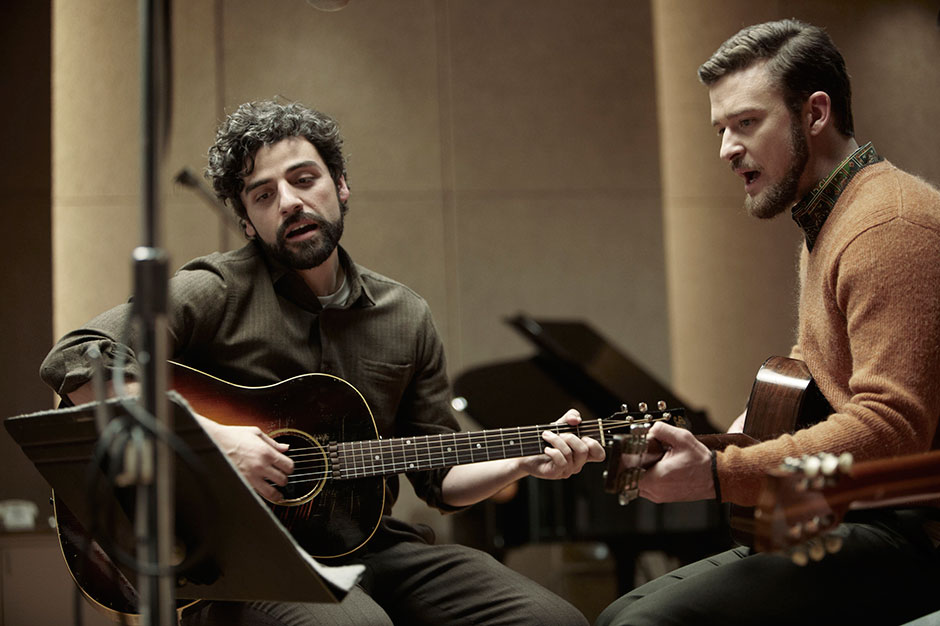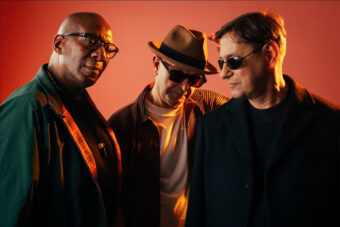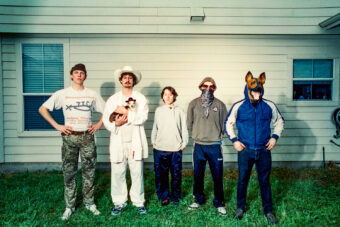In Joel and Ethan Coen’s upcoming film Inside Llewyn Davis, Oscar Isaac plays the title character, a struggling musician in the Greenwich Village folk scene of the early ’60s. He has a hard time getting gigs, has no home of his own, and keeps losing a cat. It’s an unsentimental movie, but also a frequently beautiful one, thanks in no small part to the sensitive, layered work of its star, who performed all his own music.
There’s an Oscar Isaac/likely Oscar nomination pun to be made, but I’m not gonna make it. Instead, I’ll direct you to the conversation I had with the congenial actor, who was calling from London the night after joining Marcus Mumford, Jack White, the film’s music supervisor T Bone Burnett, and others in a concert of the film’s music at Manhattan’s Town Hall.
Did the Coens discuss how they wanted you to approach performing these old folk songs?
It was funny: When I was going to audition, I knew the part was kind of being based on [New York City folk singer] Dave Van Ronk, and the one song they had sent for the audition was his “Hang Me.” I learned that one and then, because I’m obsessive that way, I listened to everything Dave Van Ronk ever recorded, and I read his book The Mayor of MacDougal Street, and I started playing his songs. So when I came in to audition, I’d learned three other Van Ronk arrangements. However, I don’t have the same voice he has — he’s got this growl, and he knows how to howl. My voice is quite different. I knew that I had to be true to that and not try to put something else on it too much.
There’s a scene in the film where your character is watching the competing folksinger Troy Nelson sing in this really mannered style, which is sort of the opposite of how Llewyn Davis sings. And Davis says that Nelson “doesn’t have any higher function.” Did you sit and down and distinguish between your character as being more emotional authentic than the other singers in the film?
I didn’t, man. What’s amazing is that there’s a strange phenomenon with the Coens where they don’t really tell anybody how a scene needs to be. The emotion is just somehow infused into the writing and the people that they cast. The tone emerges; it gets teased out and coaxed out by all of us. It’s a really weird thing. I was expecting that T Bone was going to put me through boot camp, and it was none of that. I showed up to T Bone’s place and he was like, “Hey, have you heard the new Tom Waits album?” and put on the record and left the room for an hour. And then he’d come back and be like “Want to play a song?” and I’d play a song, and then we’d go take a walk and we’d come back, and he’d say, ‘Play it again, you’re really good, maybe change that to a C instead.” It was all very easy. But you look at the movie, and it seems directed within an inch of its life, because the tone is so specific and right on. It seems so precise, and yet that precision — it happens, and I don’t really know how.
You sing in the movie with your co-star, Justin Timberlake. Was that intimidating?
Yeah, it was incredibly intimidating. Justin has near-perfect pitch. It was very, very intimidating.
Did he do anything to put you at ease?
Yeah. He was just himself, and that put me at ease. He’s really easy-going and really funny and just incredibly supportive and excited to be there.
Presumably you weren’t a giant folk music fan before taking the part. Did getting into that genre change the way you think about it now?
It feels incredibly relevant to me now. I think people are on a search for authenticity, and it feels like a particularly rootless time. People are always lamenting times past — that’s just part of existence — but there is something . . . these ideas of man as an island and people isolated among the vastness of existence, they are really percolating around these days. But folk music connects us back to our roots. T Bone says that the greatest democratizing act in the history of man kind is when Alan Lomax and those people did all their field recordings and recorded all the poor people’s songs and then broadcast it throughout earth and space. That basically fulfilled the prophesy of, “The meek shall inherit the earth.” It’s an incredible thing that happened. To try and connect back to that impulse — I think that’s what folk music does.
Llewyn Davis is extremely unsympathetic in the film, except when he’s singing. How much of a challenge was it to convey that shift?
That was the big challenge for me. Llewyn doesn’t show who he is. He is not connecting. Even though he wants too, he doesn’t want to show any warmth through any traditional means — he doesn’t try to charm anybody, he doesn’t try to ingratiate himself at all. How do you connect to someone who is such an island? The only window into his soul — because he doesn’t have a cathartic moment where he reveals himself or cries — is when he sings those songs. That idea was very much in the forefront of my mind. That’s why it was so necessary to do the music performances live on film with no playback or click tracks or anything. If we’re waiting all this time to see him open up, and if when he does you can tell it’s a movie trick, then there would be no reason to invest emotionally. But the fact that you’re seeing something live, you’re actually seeing the thing that he does, that’s what makes it effective.
If you read a book that covers the same period covered in the movie, something like The Mayor of MacDougal Street or Bob Dylan‘s Chronicles, it’s very easy to get caught up in the romance of that time and place. But the film doesn’t. Do you see it as being more truthful, in a way, than the non-fiction it’s based on?
What’s funny in The Mayor of MacDougal Street is how Dave Van Ronk talks a lot about the time and how exciting it was and how electric it was. MacDougal Street was just packed with all these people coming down. Washington Square Park had all the warring factions: the bluegrass guys hating the drummers, the jazz guys hating each other. And then there will be a paragraph about this shitty trip to Chicago he took, but then Van Ronk gets back to the fun part. That hard part is the part the Coens seize upon — that shitty trip to Chicago, because that’s where the music comes from. It comes from desperation, it comes from a dark place, it comes from all that pressure. One of the most exciting times in New York, and that’s where you follow this guy? It’s a smart move by the Coens not to do the obvious thing.
How good a guitar fingerpicker were you before you started working on the movie?
I was okay, but I didn’t know the Travis picking style style that Llewyn uses. I obsessed non-stop over that and now I can’t get out of it. I’ve still got the nails and everything.
What other research did you do for the role?
I read Dylan’s Chronicles and really delved into his repertoire. I listened to a lot of records that Dave Van Ronk would have listened to: Reverend Gary Davis and Lightnin’ Hopkins. I thought about Buster Keaton a lot, about the comedy of resilience. He’s somebody who doesn’t seem to show a whole lot in his face, but just keeps moving through space, no matter what the obstacle might be. A lot of Charles Bukowski, too. There’s a poem by Bukowski called “Bluebird” which was a bit of a mantra for me: There is a bluebird in my heart that wants to get out / But I’m too tough for him.





